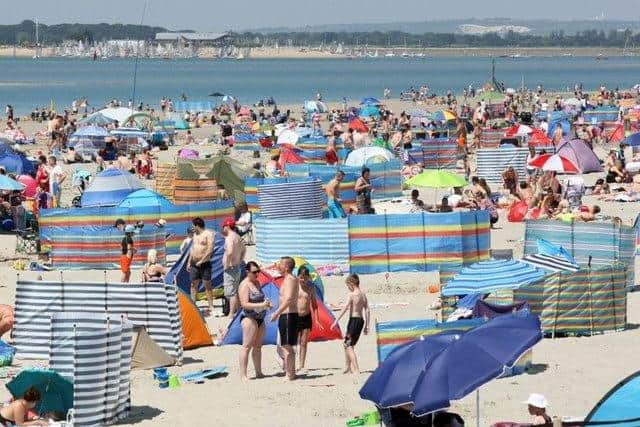Swimming in Sussex: RNLI and Coastguard issue warning ahead of summer holidays
and live on Freeview channel 276
The Royal National Lifeboat Institution (RNLI) and Her Majesty’s (HM) Coastguard are reminding families to take care when visiting the coast as new figures reveal that during the school summer holidays* last year, of the 41 lives saved by RNLI lifeguards 39 per cent were children under 13.
As schools prepare to break up in England and Wales, RNLI beach lifeguards, are expecting to be extremely busy again during the long summer break.
Advertisement
Hide AdAdvertisement
Hide AdThe RNLI and HM Coastguard are asking those visiting the coast to choose a lifeguarded beach and be aware of some basic advice to keep themselves and their families safe.
Last year RNLI lifeguards aided a total of 11,959 people during the school summer holidays. Of those, children under the age of 13 were the most assisted age group with 4,968 aided and 16 lives saved.
In Kent, Sussex and Hampshire RNLI lifeguards came to the aid of 495 people of which 242 were children and 65 teenagers. (***Figures for specific areas at the end of this release)
Gabbi Batchelor, water safety education manager for London and the South East, said: “With an estimated 35M people planning to visit the UK coast this summer**, our lifeguards will be extremely busy during the school summer holidays with younger children, in particular, needing assistance more than any other age group.
Advertisement
Hide AdAdvertisement
Hide Ad“To stay safe, we’re reminding families to choose a lifeguarded beach where possible and swim between the red and yellow flags which is the safest area as it is constantly monitored by our highly-trained lifeguards.


“A simple skill we ask everyone of any age to remember is how to Float to live if they find themselves in difficulty in the water. Lean back like a starfish, using your arms and legs to stay afloat. This will allow you to control your breathing, then call for help or swim to safety. The technique has been proven to save lives.”
Someone who knows the dangers the sea can pose is 11-year-old Finley Hassall.
Having travelled from the Midlands with his family, the schoolboy was on holiday in Cornwall and had been catching some waves on his bodyboard when he heard cries for help from another child.
Advertisement
Hide AdAdvertisement
Hide AdFinley said: "I looked around and saw waves going over this boy’s head and he was splashing and struggling. He was clearly panicking.
“I’d read in my RNLI Storm Force magazine how to float like a starfish so that’s what I asked him to do.
“I said I’d done this at my swimming lessons before and it will be fine if he could float on his back.
“He went onto his back and I was talking to him and trying to get him to take deep breaths to calm him down.
Advertisement
Hide AdAdvertisement
Hide Ad“An RNLI lifeguard soon arrived to check we were both ok and helped find the family of the boy before heading off to help two other people.”
Throughout the summer months, a children’s RNLI Seaside Safety advert will be broadcast on TV channels with the catchy song reminding those visiting the coast to float like a starfish if they find themselves in difficulty in the water.
Claire Hughes, director of HM Coastguard said: “We’re urging anyone visiting the coast and taking part in coastal activities to be aware of the dangers so they can have a safe and enjoyable summer.
“Always check the weather conditions and tide times before heading to the coast as it’s very easy to find yourself quickly cut off by the tide or blown offshore. Whatever activity you choose to do, whether it’s swimming, paddleboarding, walking or anything else near the water, look out for your friends and family to help keep each other safe.
Advertisement
Hide AdAdvertisement
Hide Ad“Please enjoy the UK’s wonderful beaches and coastline but respect their dangers and remember, in a coastal emergency, dial 999 and ask for the Coastguard.”
The RNLI’s key water safety advice for children and teenagers is:
Stop and think – Always swim in a safe place.
Stay together – Always swim with an adult, younger children and non-swimmers should always be within arm’s reach.
Float – If you find yourself in trouble in the water, float on your back like a starfish.
Call 999 in an emergency and ask for the Coastguard.